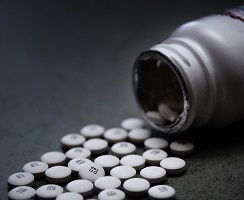
This is an archive of an Office of Justice Programs blog. This page is no longer updated and may contain outdated information and links that no longer function.
OJP Funds Opiate Intervention Court
Friday, September 22, 2017
By Alan R. Hanson, Acting Assistant Attorney General

Attorney General Jeff Sessions has made fighting the epidemic of opioid and prescription drug abuse a priority for our nation. This crisis cost nearly 60,000 Americans their lives through overdose in 2016, and it shows no sign of abating.
Nearly two-thirds of these deaths came from opioids, one of the greatest threats to both our public safety and public health. That's why the Office of Justice Programs is awarding in FY 2017 118 grants totaling $59 million to fight substance abuse. These reflect the President's new Comprehensive Opioid Abuse Program and additional funds for efforts such as drug courts and prescription-drug-monitoring programs.
Combatting this crisis requires a broad approach that, according to the Attorney General, must include law enforcement, treatment and prevention. It also requires innovative responses, such as opiate intervention courts like the one recently launched in Buffalo, New York.
With 296 confirmed deaths due to overdose in 2016, officials in Erie County have established this special court to save lives. Since the synthetic opioid fentanyl entered the illegal drug market, the risk of overdose has increased. Fentanyl is up to 50 times stronger than heroin and, unknown to users, is often mixed with heroin or morphine???with deadly results.
A grant from the Office of Justice Programs' Bureau of Justice Assistance helps fund Buffalo's pilot program. The funding covers some staff for the court and treatment programs, which include addiction counseling and medical interventions.
Drug courts have operated since the mid-90's, created in response to the epidemic of crack cocaine. Approximately 3,000 are now in place throughout the U.S. Their purpose is to provide treatment instead of prison time for nonviolent persons who have been criminally charged and who have a substance abuse problem. Treating the underlying issue of addiction can keep these offenders from recycling through the judicial system.
Several studies, including a ten-year longitudinal analysis conducted by OJP's National Institute of Justice, have confirmed the benefits of drug courts. These include reduced recidivism, ranging from 17 to 26 percent, and average savings of $6,744 per participant, compared with traditional criminal courts. With findings like these, BJA's Adult Drug Court Discretionary Grant Program is giving priority consideration to funding drug court applicants who provide a strategy for decreasing the tragic deaths from opioid abuse.
How does the opiate court work? All Buffalo arrestees are now tested for opiate use. Those found to have an addiction problem are placed in inpatient or outpatient treatment, depending on their needs. The distinctive element of the Buffalo opiate court is its Rapid Integration Team, which links individuals to treatment immediately, instead of within 30 to 90 days as in traditional drug courts.
The RIT, which includes a licensed and credentialed substance abuse counselor, monitors the new drug court participants. This includes the use of daily electronic-monitoring tools. The counselor conducts clinical assessments and manages the addiction behaviorally and medically.
Since its launch on May 1, the Buffalo opioid court has sent 113 of those arrested to treatment. While 9 have left the program because they declined to complete treatment, none have died so far, a significant achievement considering the grave dangers of opioids. But attending treatment doesn't absolve criminal charges. Successful completion of treatment may be a positive factor in a case's resolution, but other sanctions may be merited.
"I believe that the Department's new resources and new efforts will bring more criminals to justice, and ultimately save lives. And I'm convinced this is a winnable war," said Attorney General Jeff Sessions on September 21 in Charleston, West Virginia, at the West Virginia on the Rise: Rebuilding the Economy, Rebuilding Lives event. "Through prevention, enforcement, and treatment, we can make this country safer for every American."
I agree with the Attorney General's statement, and I am proud that OJP is playing such a leadership role in combatting our nation's epidemic of substance abuse.

